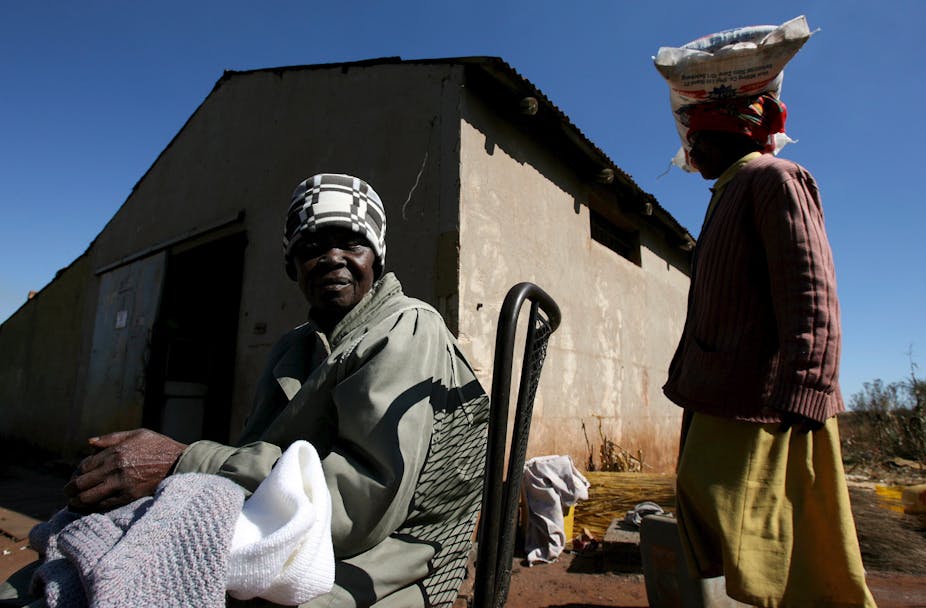Solutions to poverty and social exclusion tend to focus largely on national social and economic policies and the monitoring of national poverty indicators. Often missing from these conversations, but equally important, is the need for a perspective that privileges the knowledge, experience, capacities, aspirations and efforts of citizens and communities to improve their lives.
Innovative solutions that connect with people’s real life situations, and that take the voices of the poor into account, are critical in shaping such solutions.
In-depth community based research conducted in Doornkop, Soweto, over a decade by researchers from the Centre for Social Development Africa at the University of Johannesburg, has captured these voices. Doornkop is one of the ten poorest wards in Johannesburg, South Africa’s largest city. It is home to 61 000 people, most of whom live in extreme poverty and in stressed circumstances.
The research is published in a newly released book that we co-edited. It provides a vignette of the potential to “learn from below”. It also provides insight into the lives of people who continue to struggle daily to build meaningful lives. It prioritises their actual experiences of and responses to a range of social, financial and health challenges.
It also interrogates the effect that policies designed by the government at national level have on their lives.
Difficult choices
Despite enormous challenges, Doornkop’s residents are motivated to lead better lives. But they have to make difficult choices and trade-offs and have to work actively to achieve their goals. Interventions at the individual, household and community level can support agency, build people’s capabilities and strengthen social networks. But a range of barriers – structural as well as social – can undermine their best efforts.
A range of issues emerged from the participants’ stories. One was how socially prescribed notions of gender affect their lives. For example, some women who received welfare grants reported having to navigate their way around negative assumptions. These included accusations that they were undeserving or lazy or that they get free money for having children, known as “imali yeqolo” (colloquially meaning “money for sex”). These labels made them feel devalued and stigmatised.
As elsewhere in South Africa, Doornkop has a high rate of father absenteeism. Some women who got grants reported that some fathers used the child support grant as an excuse not to pay child maintenance. The grant is a means-tested cash transfer benefit paid to the primary caregiver of a child under 18 years who meets the eligibility requirements. It benefits 12 million children.
This illustrates how gender beliefs and practices about parenting and care can reinforce gender inequality and compromise child well-being. Yet, insufficient attention is paid to finding solutions to these challenges.
In tandem with these negative views, respondents also expressed strong support for the grants distributed by government, and their need for them. They said the child grant buys food, clothing and other necessities. Others said it empowers women by increasing their financial independence and decision-making power over how money is used. The grants also have a positive effect on caregiving for children.
Social solidarity and resilience
Interestingly, the interviews also showed that the child grant has some positive unintended consequences too. For example, they build social solidarity and a sense of a shared fate. This in turn served to protect individuals and their families against risks and shocks, such as a death in the family or the loss of a home, and to build mutually beneficial social networks. These are a vital source of social and economic support. As one respondent said:
We are helping one another, when they don’t have anything, then they are giving [me], [and] we need to help others, and then your community can be a right place.
This suggests that people who receive grants aren’t simply passive recipients of public benefits.
Stories from the ground also highlighted the unmet needs of people who are vulnerable and left behind.
A third of women in the sample were diagnosed with depression, largely associated with the stress of having to cope with poverty. Better mental health screening, treatment and social support is needed in poor communities like Doornkop. In addition, unemployment and struggles to access post-secondary education and training, as well as early motherhood placed young people at risk of long-term poverty.
Despite the challenges, there was also evidence of high levels of resilience. Older women had very good ability to “bounce back” after experiencing adversity. Social and family support, religious faith and participation in burial societies and stokvels mediated depression and built resilience.
The research shows that although social grants make an important contribution in reducing income poverty with positive multiplier effects, other social interventions are needed to build human capabilities, reduce vulnerability and social exclusion. Gender beliefs about care contribute to inequality within and among families. They call for a multidimensional approach to finding accessible community level solutions.
Political significance
Finally, a strong link emerged from the research about the relationship between socio-economic factors and democracy. People know their rights, participate actively in national and local elections and attend ward council meetings to improve their conditions.
In fact, more grant beneficiaries in Doornkop voted or planned to vote in two previous elections than non-beneficiaries. Trust in the party of their choice, and the exercise of their democratic rights, were as important as the ability of a political party to satisfy their needs. This suggests that poor performance in service delivery and social grants are likely to have significant electoral consequences for the incumbent party.

